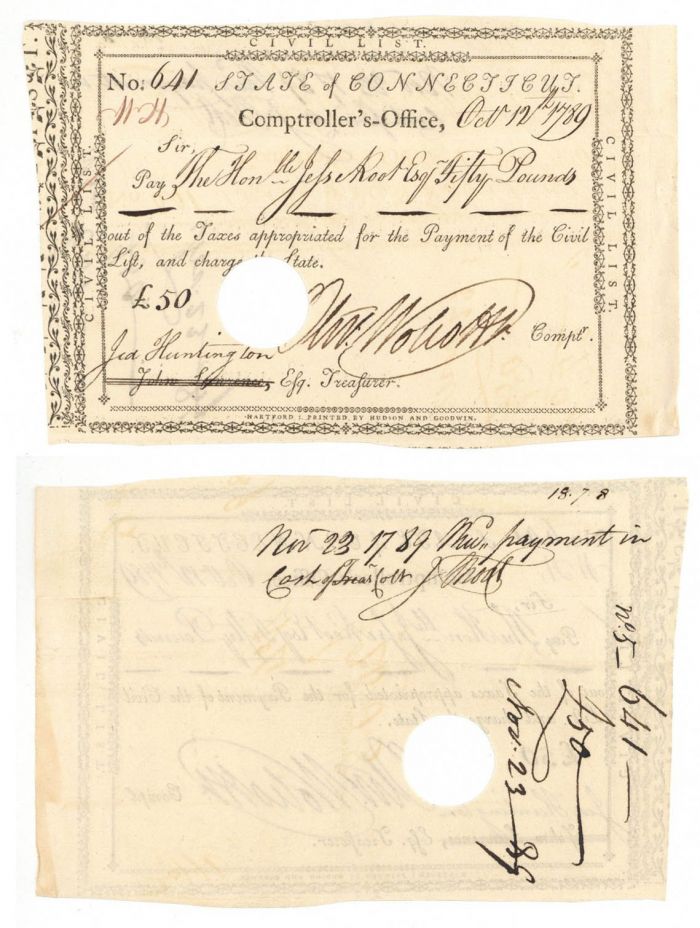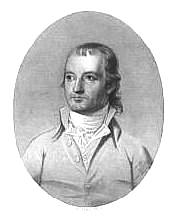1789 dated Pay Order Issued/Signed to Jesse Root and Jed Huntington and Oliver Wolcott Jr. - Connecticut Revolutionary War Bonds
Inv# CT1108 Autograph
State of Connecticut Pay Order issued to Jesse Root and signed by him on back. Also signed by Jed Huntington and Oliver Wolcott Jr. on front.

Jesse Root (December 28, 1736 – March 29, 1822) was a prominent American minister and attorney hailing from Coventry, Connecticut. Throughout the American Revolution, he played a significant role on the Connecticut Council of Safety and within the Connecticut militia. Initially appointed as a lieutenant colonel in Peekskill in 1777, he advanced to the position of Adjutant-General of the Connecticut Line. Root represented Connecticut as a delegate to the Continental Congress from 1778 to 1782 and served as the chief justice of the Connecticut Supreme Court from 1796 to 1807, in addition to holding the position of a state court judge. He was an active member of the Connecticut House of Representatives and participated in the Connecticut Constitutional Convention. Furthermore, he was affiliated with the First Company, Governor's Foot Guard, where he held the role of commandant from May 1798 to October 1802. His lineage includes his grandson, Austin Cornelius Dunham.

Oliver Wolcott Jr. (January 11, 1760 – June 1, 1833) was an American politician and judge. He served as the second United States Secretary of the Treasury, a judge on the United States Circuit Court for the Second Circuit, and the 24th Governor of Connecticut. Wolcott began his adult life working in Connecticut, later joining the federal government in the Department of Treasury, before returning to Connecticut, where he spent the remainder of his life until his death. Over the course of his political career, Wolcott's views shifted from Federalist to Toleration and ultimately to Jacksonian. He was the son of Oliver Wolcott Sr. and was part of the Griswold-Wolcott family.
Born on January 11, 1760, in Litchfield, Connecticut Colony, British America, Wolcott served in the Continental Army from 1777 to 1779 during the American Revolutionary War. He graduated from Yale University in 1778, where he was a member of the Brothers in Unity society, and studied law in 1781.
Before becoming the second Secretary of Treasury, Wolcott was the first Auditor in the Treasury Department. According to Richard White, his duties as Auditor involved making the initial examination of accounts and determining balances on all claims against the government. Working alongside the first Secretary of Treasury, Alexander Hamilton, and as a fellow Federalist, Wolcott became a target for criticism from Thomas Jefferson. This was due to the rivalry between Hamilton's Federalists and Jefferson's Democratic-Republicans, who were the two main political factions of the time.

Jedediah Huntington (also known as Jedidiah Huntington), born on August 4, 1743, and passing on September 25, 1818, was a general in the Continental Army during the American Revolutionary War. Following the conflict, he held various civilian roles. Born in Norwich, Connecticut, he was the son of Jabez and Elizabeth (Backus) Huntington. Huntington completed his undergraduate studies at Harvard in 1763 and earned a master's degree from Yale University in 1770. He was involved in business ventures alongside his father, actively participated in the Sons of Liberty, and was a member of the Committee of Correspondence established in Norwich on June 6, 1774. Described as a man of slight build, his significance was more intellectual and moral than physical, as evidenced by a record from August 19, 1788, which noted the weights of several revolutionary officers at West Point: General Washington at 209 pounds, General Lincoln at 224, General Knox at 280, and General Huntington at 132 pounds.
As the war loomed, Huntington took on a prominent role in the Norwich militia, being appointed ensign of the first Norwich militia company in October 1769, promoted to lieutenant in 1771, and elevated to captain in May 1774. In October 1774, he was appointed Colonel of the 20th Regiment of Connecticut Militia. When Israel Bissell delivered the Lexington Alarm to Norwich on April 20, 1775, he brought it directly to Colonel Huntington, who promptly prepared his men to march. By April 26, they reached Wrentham, Massachusetts, and shortly thereafter joined the Siege of Boston in Roxbury.










Ebay ID: labarre_galleries